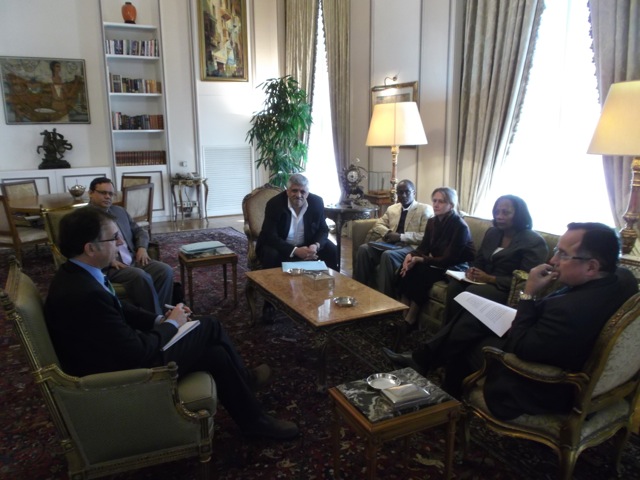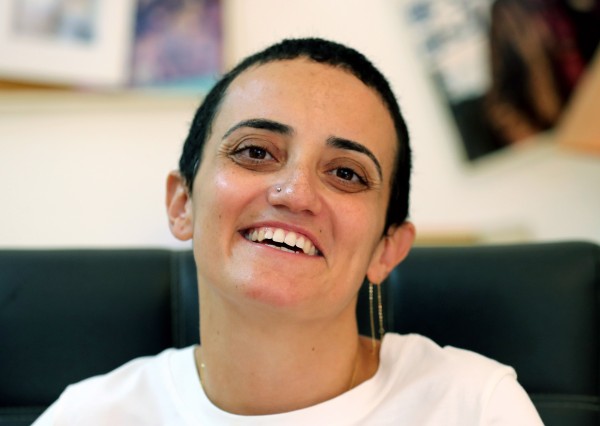Egypt’s public prosecutor announced on Wednesday that 20 journalists working for the international network Al Jazeera will face trial on charges of terrorism and spreading false news. The journalists face up to 15 years in prison, if found guilty.
According to news sources, of the 20 journalists charged yesterday, 16 Egyptian journalists are accused of joining a terrorist group and face up to 15 years in prison; four foreign journalists also working for Al Jazeera face charges of spreading false news and face up to three years in prison.
“The charges against these journalists are absurd and IPI condemns their treatment in the strongest possible terms,” said IPI Executive Director Alison Bethel McKenzie, who returned from Cairo on Tuesday. “This news comes as an unwelcome surprise after the commitment to press freedom that Egyptian Foreign Minister Nabil Fahmy expressed to IPI during our meeting.”
“We urge the courts to exercise their independent authority and review these cases without giving in to undue political influence,” Bethel McKenzie said.
“As for the interim government, we urge them to reflect on how easily these overly broad terrorism laws can be abused to stifle legitimate expression.”
From Jan 26 to 29, an IPI delegation including four members of IPI’s executive board travelled to Cairo to meet with government representatives – including the country’s foreign minister, Nabil Fahmy, and the chairman of the State Information System, Ambassador Salah A. El-Sadek – as well as lawyers, journalists and human rights groups to assess the state of press freedom in the country.
Four Al Jazeera English (AJE) journalists – Nairobi-based correspondent Peter Greste, an Australian citizen; AJE bureau chief Mohamed Fahmy, who holds Canadian citizenship; Cairo-based producer Baher Mohamed; and cameraman Mohamed Fawzy – were detained in Cairo on Dec. 29, 2013. State security agents reportedly interrogated the four journalists yesterday in connection with interviews they conducted with members of the Muslim Brotherhood, which the government has labelled a “terrorist organisation”. The journalists were accused of broadcasting illegally from a makeshift bureau in a Cairo hotel, spreading “false news”, “damaging national security”, and possessing materials promoting “incitement”. Mohamed Fawzy was eventually let go a few days after.
Earlier in 2013, Al Jazeera correspondent Abdullah Al-Shami was detained on Aug. 14 while covering demonstrations in Cairo’s Rabaa Square and Mubasher Misr cameraman Mohamed Badr was arrested on July 16, in connection with his coverage of clashes at Ramses Square.
The IPI 2009 Vienna Declaration on Terrorism, Media and the Law states that “The media should be free to report on terrorism, including terrorist acts and ideology, as long as this does not constitute intentional incitement to terrorism. Such reporting should not be penalised as ‘radicalising’ potential terrorists or under other vague and unduly broad grounds, such as ‘glorifying’, ‘justifying’ or ‘promoting’ terrorism or extremism.”
This echoes the 2008 joint statement by the UN Special Rapporteur on freedom of opinion and expression, as well as regional rapporteurs on freedom of expression and the media from the Organization for Security and Co-operation in Europe, the Organization of American States and the African Commission on Human and Peoples’ Rights, that stated: “Vague notions such as the provision of assisting communications in terrorism or extremism, the “glorification” or the “promotion” of terrorism or extremism, and the mere repetition of statements made by terrorists do not themselves constitute incitation and must not be penalised.”
“The vital role of the media in the exercise of freedom of expression and the provisions of information to the public must be respected in the laws against terrorism and extremism. The public has the right to be informed on the commission or attempted commission of terrorist acts, and the media must not be punished for providing this information,” the joint statement noted.
Pointing out that “an important objective of many of those committing acts of terrorism is to undermine democracy and weaken respect for human rights,” the preamble to the Vienna Declaration on Terrorism, Media and the Law notes that “to respond to terror by unduly restricting rights, including the right to freedom of expression, would be to play into the hands of terrorists.”
In a Jan. 14-15 referendum, Egyptian voters approved a new Constitution that provide guarantees of press freedom, freedom of publication and the independence of the news media, including protections against censorship, confiscation, suspension and closure of news media.
In welcoming press freedom guarantees under the new Constitution, IPI pointed out that the jailing of journalists in connection with their legitimate professional activities is in clear breach of the spirit of the new fundamental law.
IPI will release a report on the findings of its visit to Egypt in the coming weeks.



